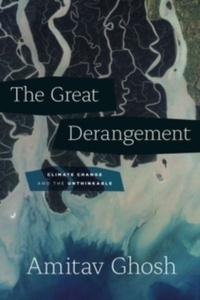The Great Derangement : Climate Change and the Unthinkable

Editorial University Of Chicago Press
Fecha de edición septiembre 2016 · Edición nº 1
Idioma inglés
EAN 9780226323039
176 páginas
Libro
encuadernado en tapa dura
Resumen del libro
Are we deranged? The acclaimed Indian novelist Amitav Ghosh argues that future generations may well think so. How else to explain our imaginative failure in the face of global warming? In his first major book of nonfiction since In an Antique Land, Ghosh examines our inability at the level of literature, history, and politics to grasp the scale and violence of climate change. The extreme nature of today's climate events, Ghosh asserts, make them peculiarly resistant to contemporary modes of thinking and imagining. This is particularly true of serious literary fiction: hundred-year storms and freakish tornadoes simply feel too improbable for the novel; they are automatically consigned to other genres. In the writing of history, too, the climate crisis has sometimes led to gross simplifications; Ghosh shows that the history of the carbon economy is a tangled global story with many contradictory and counter-intuitive elements. Ghosh ends by suggesting that politics, much like literature, has become a matter of personal moral reckoning rather than an arena of collective action. But to limit fiction and politics to individual moral adventure comes at a great cost. The climate crisis asks us to imagine other forms of human existence a task to which fiction, Ghosh argues, is the best suited of all cultural forms. His book serves as a great writer's summons to confront the most urgent task of our time.
Biografía del autor
Autor indio bengalí. Estudió en el internado masculino The Doon School de Dehradun. Creció en la India, Bangladesh y Sri Lanka. Mientras estudiaba, colaboraba regularmente con ficción y poesía en The Doon School Weekly (dirigido entonces por Seth) y fundó la revista History Times junto con Guha. Después de Doon, se licenció en el St Stephen's College, la Universidad de Delhi y la Delhi School of Economics. Obtuvo la beca de la Fundación Inlaks para completar un doctorado en antropología social en St Edmund Hall, Oxford. Trabajó en el periódico Indian Express de Nueva Delhi y en varias instituciones académicas. En 1986 publicó su primera novela. Ghosh Ganó el 54º premio Jnanpith en 2018, el mayor galardón literario de la India. Ha recibido dos premios Lifetime Achievement y cuatro doctorados honoris causa. En 2007, el Presidente de la India le concedió el Padma Shri, uno de los más altos honores del país. En 2009, fue elegido miembro de la Royal Society of Literature. En 2010 fue ganador, junto con Margaret Atwood, del premio Dan David, y en 2011 recibió el Gran Premio del festival Metrópolis Azul de Montreal. Fue el primer escritor en lengua inglesa en recibir el galardón.








